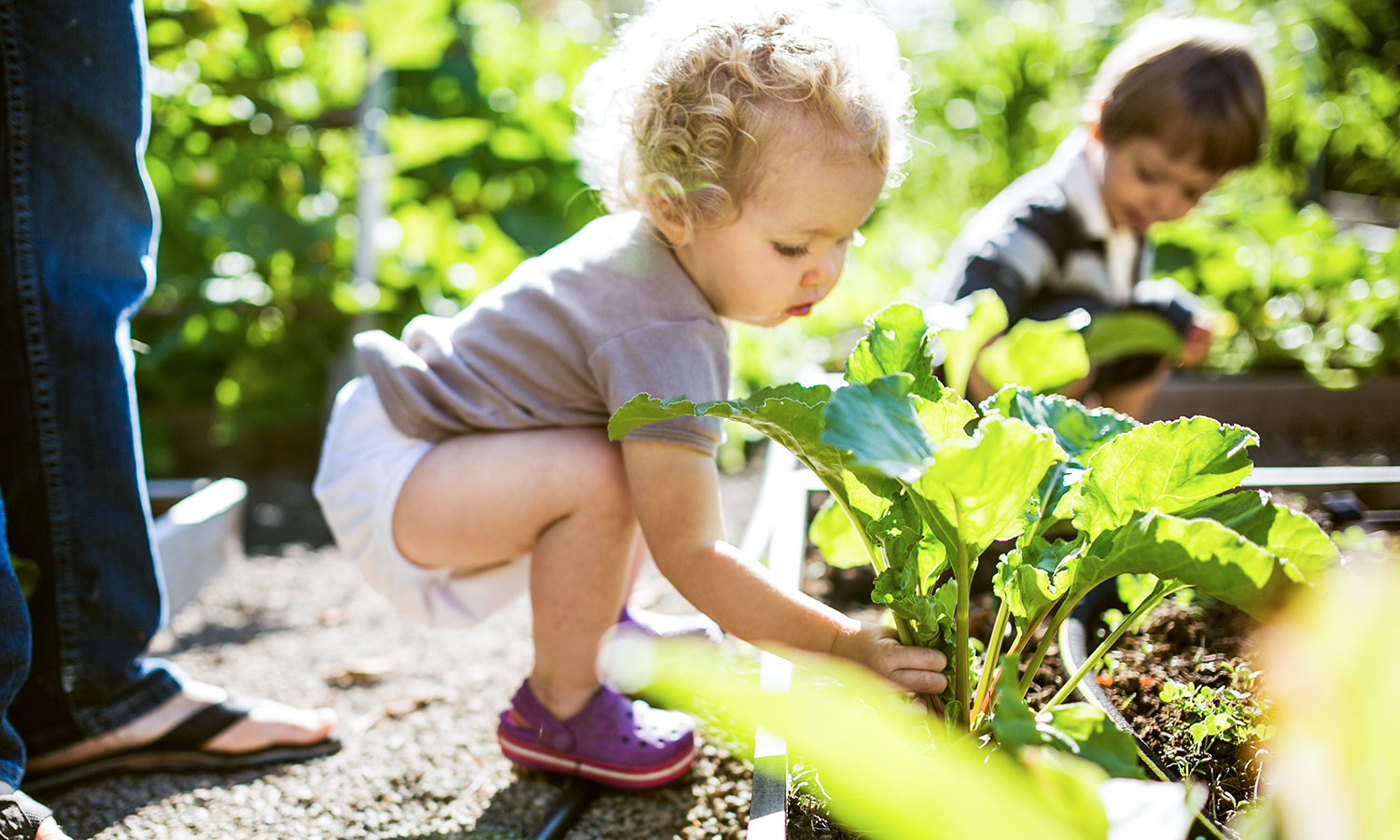Like what you see?
Sign up to receive more free parenting advice.
Thank you for subscribing to our newsletter!
Early Learning

Credit: iStock.com/RyanJLane
While there are those among us who shudder at the thought of simply keeping a succulent alive, the benefits of gardening in the preschool years shows just how important this activity is for young children.
Whether that garden is part of the backyard, a few pots on the apartment’s balcony or part of a community garden, Dr Kate Neale, Childhood Studies and Therapeutic Horticulture researcher1 explains that gardening is more than just an opportunity to play with dirt.
“Gardens are some of the best integrated learning environments,” says Dr Neale.
“They make for beautiful maths, science or art classrooms, places for imaginative play and spaces where children can retreat and recharge.
“Gardening engages children’s natural curiosities, like how plants grow, what different foods look and taste like, what insects help or hinder our gardening, water management, composting and the importance of climate for the food we grow.”
Gardening isn’t just limited to scientific exploration and observation.
Dr Neale says that it also is an expression of creativity.
“The seemingly endless array of textures, colours and shapes in the garden provide a wonderful palate for the expression or interpretation of ideas,” she explains.
“Those expressions provide an outlet for emotions and remedy to worry.
“We know when children spend time in greenspaces they worry less, and feel an increased sense of belonging, inclusion and connection to the world around them.”
Gardens can also celebrate diversity.
“Culturally, gardens provide a wonderful opportunity to incorporate plants or activities of cultural significance,” adds Dr Neale.
“Nurturing children’s relationship with nature is also a great way to celebrate our Indigenous peoples’ connection to country and the importance of story sharing, passing down knowledge between generations and learning through demonstration which are all pillars of the oldest continuous culture in the world.”
We know when children spend time in greenspaces they worry less, and feel an increased sense of belonging, inclusion and connection to the world around them.Dr Kate Neale
Stay up to date with the latest news and articles from First Five Years
Thank you for subscribing to our newsletter!
The life skills gardens teach our children
In 2007, American researchers found children who participated in gardening acquired key life skills that help them be more successful in school and better navigate the world.
Dr Neale agrees, “There are so many life skills that can be taught to young children through time spent tending to plants and working with others in the garden”.
The first key learning identified by Dr Neale is the importance of being gentle.
“Taking care when handling plants reminds children of the importance of taking our time, being careful and touching lightly,” she says.
She explains that caring for plants is a lesson in the importance of caring for ourselves and others, in order for our bodies and our relationships to grow.
The second key learning is the importance of respecting other people’s knowledge.
Dr Neale explains that gardening for the first time requires children to learn to listen to those with more knowledge and experience.
“They learn that by listening to others, we can learn to do new activities,” she explains.
The next is the all-important skill of teamwork.
Dr Neale explains that gardening is a perfect opportunity for children to learn about turn-taking (with tools or access to garden beds) and the importance of the sequential tasks that are required to get the larger job done.
“When we involve children in this process, they learn the importance of taking turns, making sense of tasks and the benefits of teamwork in achieving something bigger than we could do alone,” she says.
In a fast-paced, never-wait world, gardening teaches patience.
“Gardening forces us to appreciate the natural rhythm within nature and how long things actually take to grow,” adds Dr Neale.
Finally, gardening teaches young children resilience.
“Gardening involves setbacks or failures at times and that we can’t always control everything,” explains Dr Neale.
“This is an important life lessons as we learn to regroup and retry in the hope of future success.”
Gardening with children
“Adults often say they are ‘gardening WITH children’ when actually they are just letting children be a part of their vision for a garden,” notes Dr Neale.
Her first strategy to get children excited about gardening is involving children at all stages of the gardening process, including the planning and design stage.
The next step is finding out what knowledge your child has about the tasks involved in gardening.
“By acknowledging their existing knowledge or experiences, you are instilling confidence that they can contribute,” explains Dr Neale.
“This will encourage them to take the lead, support others and use their communication skills to demonstrate their knowledge throughout the activity.
“The conversation will also act as a gentle reminder that others will also have skills and experience to help in the garden and teamwork will involve everyone having a go.”
The third strategy is to find out what your child’s interests are.
She recommends empowering children by giving them a range of tasks to choose from.
Once you have a better idea of what activities they gravitate to, you can then tailor these in a way that extends their learning and keeps them engaged.
Dr Neale advises that perfectly manicured gardens are lovely to look at but can be incredibly boring.
She recommends having a series of tasks and activities for you and your child to do, but to not feel like you need to get everything ticked off on day one.
“Many of the benefits of gardening for children come from the process of gardening, not sitting idle admiring a perfectly manicured bed with nothing to do,” she says.
“Think about natural pauses in jobs so if a child begins to lose interest, it’s okay to leave whatever you got up to and come back another day.”
Finally, for both parent and child to enjoy gardening, Dr Neale recommends allocating part of the garden for the child to do as they please.
“Set aside a portion of the garden where anything goes,” she says.
“It might mean you have 100 carrot seeds strewn amongst the lettuce or mysterious tomatoes growing in spaces you didn’t expect.
“But, because you’ve technically planned for this and contained the chaos to one section of the garden, you can still have your own vision for the garden, whilst the children have theirs.”
[1] Dr Kate Neale, Childhood Studies and Therapeutic Horticulture researcher at the Centre for Children and Young People, Southern Cross University and Centre for Urban Greenery and Ecology, Singapore National Parks | Vice President of Therapeutic Horticulture Australia| www.digability.com.au
Other activities to teach care and nurturing:
- Visit an aged care facility, or have your children draw or paint pictures that you can drop off.
- Volunteer at an animal shelter - giving dogs and cats cuddles.
- Instead of receiving birthday presents, ask guests to provide a donation to a charity and teach your child about the value of giving.
- Bake some treats and drop it off at a hospital, fire or police station to thank the heroes in our community.
- Have your child go through their toys and choose some items to donate to charity.






